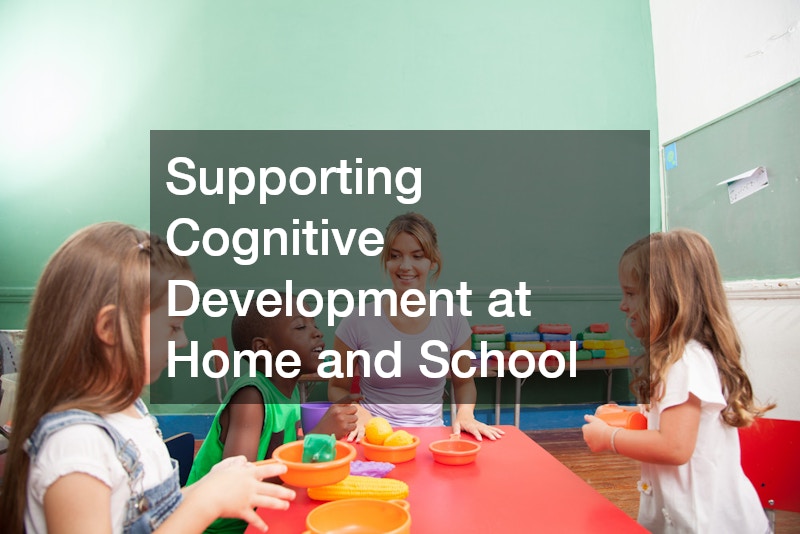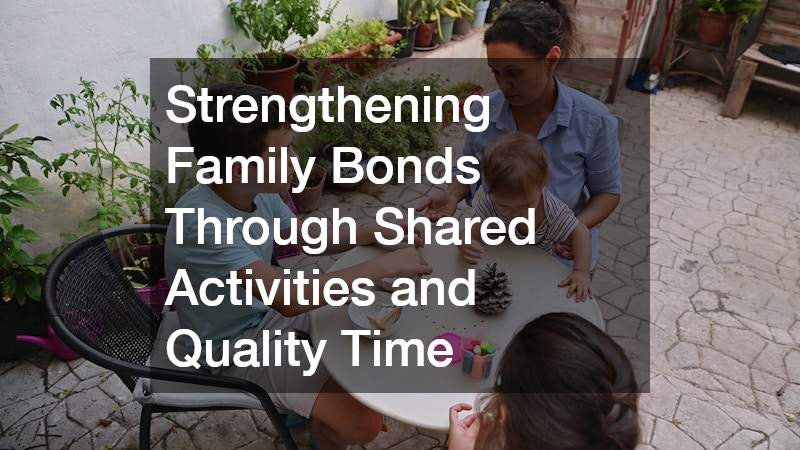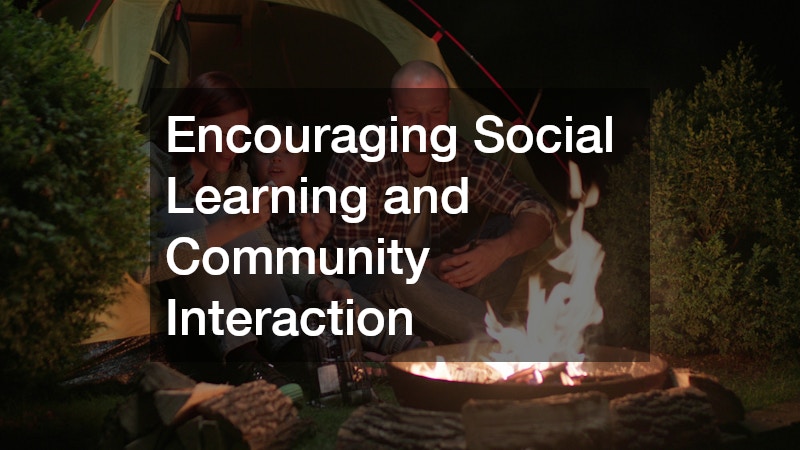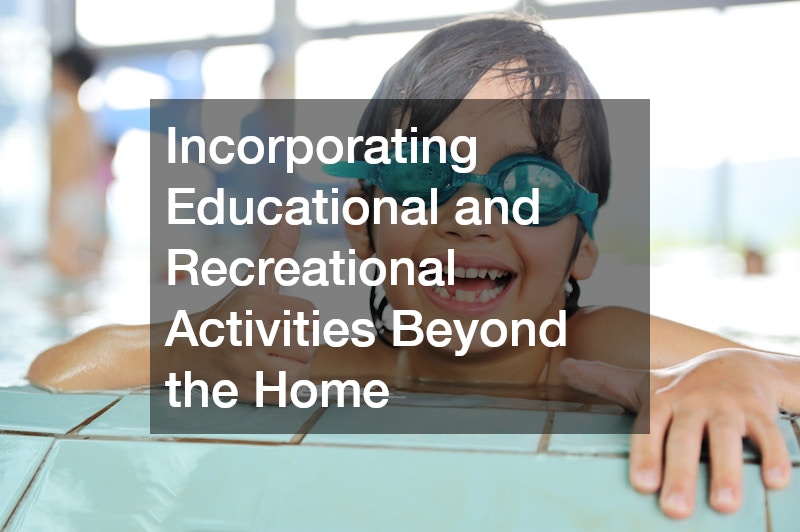Creating a meaningful and balanced childhood is something many parents strive for, yet it often feels more complicated than it needs to be. Between busy schedules, school expectations, and the desire to help kids grow into capable, confident individuals, families can sometimes overlook simple but highly impactful ways to shape a child’s world. Supporting enriching childhood experiences does not require elaborate planning or constant spending. Instead, it comes from consistent engagement, thoughtful exposure to opportunities, and environments that encourage curiosity, physical wellness, emotional development, and imagination. When families take small steps toward connection, education, and exploration, they create a foundation that will benefit children for years to come. Throughout this article, families will discover practical and realistic approaches to fostering growth across a variety of settings, both at home and within the community.
Fostering Emotional Growth Through Everyday Routines
Emotional development is one of the most meaningful parts of a child’s early life, and it doesn’t require complicated systems or rigid structures. Small, frequent interactions are often the most influential. Parents who aim to provide enriching childhood experiences can begin by weaving emotional openness and support into daily routines. Simple actions like asking kids about their day, discussing how they feel, or exploring how to respond to challenges help children understand their emotions in clearer ways. This doesn’t have to be formal. Breakfast conversations, car rides, bedtime check-ins, and moments between tasks are all opportunities for connection.
One overlooked component of emotional learning is modeling. Children often look to parents for cues on how to interpret different situations. When adults openly communicate their own feelings with responsibility and calmness, kids learn valuable strategies for managing big emotions. Similarly, validating a child’s feelings—even when they stem from seemingly minor situations—helps them recognize their experiences as meaningful and deserving of attention. Over time, children develop stronger emotional resilience, which supports enriching childhood experiences throughout their developmental stages.
Families can also build emotional awareness through storytelling. Books, real-life scenarios, cultural traditions, and social situations provide opportunities to discuss empathy, kindness, and problem-solving. Parents can pause to ask questions like, “Why do you think that character felt that way?” or “What could they have done differently?” These questions help kids internalize positive behaviors and understand multiple viewpoints. Sensitivity to others becomes more natural when children regularly practice interpreting emotions.

Supporting Cognitive Development at Home and School
Cognitive growth plays a major role in enriching childhood experiences, but it doesn’t require parents to replicate a classroom environment. Every day life provides countless opportunities for kids to strengthen their critical thinking skills, language development, and problem-solving abilities. Asking open-ended questions encourages children to think independently and articulate their thoughts. For example, instead of asking yes-or-no questions, parents might ask, “What do you think will happen next?” or “Why do you think this works that way?” These questions help children explore ideas more deeply.
Families can also incorporate learning into household activities. Cooking transforms into a lesson about measurements, sequencing, and cause and effect. Reading together builds vocabulary, comprehension, and creativity. Sorting laundry becomes an opportunity to reinforce categorization skills. Even running errands can teach budgeting, organization, and decision-making. Every day experiences become building blocks that support enriching childhood experiences simply by encouraging participation.
Children benefit from structured educational exposure as well, including community or school programs such as children bible lessons. Programs like these can enhance moral development, literacy skills, memory, and comprehension. While values-based learning varies by family preference, it often provides a supportive environment for social and cognitive growth. Parents may also explore tutoring options, library events, and reading programs that align with their child’s interests and learning style.
A strong school environment also contributes significantly to cognitive development. Some families choose to explore best local private schools, which may offer smaller class sizes, unique curricula, or specialized enrichment programs. Regardless of the school type, parents who stay engaged—attending conferences, communicating with teachers, monitoring assignments—create a home environment that reinforces academic growth. Supporting learning at home and partnering with educators ensures that school experiences remain positive and aligned with a child’s needs.
Ultimately, cognitive development flourishes when children are encouraged to explore, think independently, and remain curious. Parents who nurture everyday learning habits create enriching childhood experiences that extend far beyond traditional academics.
Nurturing Healthy Physical Development
Physical health is central to a child’s overall well-being and influences energy, mood, learning, and long-term habits. Parents who aim to create enriching childhood experiences often start by ensuring their kids have access to active play, nutritious meals, and proper healthcare. Even simple routines such as taking family walks, biking together, or doing quick morning stretches teach children the importance of movement and balance.
Consistent preventative care is equally essential. Regular visits to pediatric dentists help children establish good oral hygiene habits early, reducing long-term risks and promoting confidence. Dental health is often overlooked, but strong habits during childhood lead to healthier outcomes throughout adulthood. Similarly, having access to nearby healthcare providers like local urgent care centers reassures families during unexpected illnesses or minor injuries. These facilities ensure quick care without long wait times, reducing stress for both children and parents.
Nutrition also plays a vital role in physical development. Balanced meals rich in fruits, vegetables, proteins, and whole grains support brain function, concentration, and energy levels. Children learn food behaviors through exposure, consistency, and modeling. Involving kids in meal prep is an excellent way to teach nutrition while reinforcing independence and fine motor skills.
Encouraging Social Learning and Community Interaction
Social development is a vital part of enriching childhood experiences and grows best through consistent interaction with peers and trusted adults. Parents can support this growth by offering opportunities for children to practice communication, cooperation, and conflict resolution in real-world environments. Activities like group play, community events, and family gatherings expose kids to different personalities and situations, helping them adapt to new social settings.
Structured activities also promote social learning. Many families choose afterschool program activities because they offer supervised environments where children can collaborate, explore interests, and build friendships. Whether participation involves sports, arts, STEM clubs, or community service programs, these experiences help children practice teamwork and responsibility. Kids learn how to follow instructions, negotiate roles, share ideas, and problem-solve with peers—skills that contribute to stronger confidence and adaptability.
Community outings further expand social learning. Visiting parks, museums, local shops, or recreational centers encourages children to interact naturally with others, observe different behaviors, and practice communication skills. Trips to places like local campgrounds provide opportunities for teamwork, patience, and outdoor exploration. Camping also helps children practice independence, learn survival basics, and experience the excitement of nature, reinforcing enriching childhood experiences in memorable ways.
Families can also encourage social responsibility and empathy. Volunteer activities—such as participating in community cleanups or collecting items for donation—help children understand the importance of helping others. Small experiences like writing thank-you notes, sharing toys, or assisting siblings build a foundation of kindness.
Creating Educational Play Spaces at Home
Home environments play a major role in creating enriching childhood experiences. A well-designed learning space doesn’t need to be large or expensive. What matters most is that it encourages imagination, independence, and exploration. Children benefit from having areas dedicated to art, reading, building, or pretend play, even if these zones take up only small portions of a room.
For example, a reading corner with books, soft seating, and good lighting invites children to explore stories independently. Art spaces stocked with crayons, paper, washable paints, and craft materials promote creativity. Building blocks, puzzles, science kits, and sensory bins stimulate hands-on learning and fine motor skills. These spaces encourage children to guide their own interests and deepen their creativity.
Outdoor play spaces are equally important. Thoughtful backyard landscaping can create safe, engaging environments that encourage physical activity and exploration. Parents may choose to include features like garden beds, climbing structures, or shaded seating areas. Gardens teach responsibility and introduce children to plant life cycles, while open green spaces encourage running, imaginative games, and independent exploration. Families who spend time together outdoors reinforce curiosity and appreciation for nature.
Safety is another key consideration when creating play spaces. Installing secure boundaries through services from local fence companies helps ensure children can explore freely within a safe perimeter. When children feel secure in their play environments, they are more willing to discover, imagine, and experiment—an essential element of enriching childhood experiences.
Indoor and outdoor learning spaces help children understand that exploration is welcome. When parents create comfortable, accessible environments that invite curiosity, children gain confidence and enthusiasm for learning through play.
Incorporating Educational and Recreational Activities Beyond the Home
Children grow through exposure to new experiences, environments, and challenges. Beyond the home, families can explore opportunities that encourage learning and adventure in everyday life. Local attractions, community events, and recreational activities all contribute to enriching childhood experiences by expanding a child’s understanding of the world.
Outdoor recreation is especially valuable. Activities such as swimming, hiking, biking, or visiting nature trails teach coordination, environmental awareness, and resilience. Some families invest in an in ground swimming pool installation to encourage frequent outdoor activity and offer a fun, safe place for children to develop water skills. Swimming supports physical development, confidence, and safety awareness, making it a valuable skill for children of all ages.
Regular family outings, even simple ones, broaden a child’s perspective. Visiting museums, cultural centers, science exhibits, or historical sites helps children learn through hands-on, visual, and experiential methods. Families can also plan seasonal activities like pumpkin patches, fairs, snow play, or holiday light tours to add variety and excitement to their routines.
Recreational activities also strengthen family bonds. Dining experiences, whether at home or in the community, offer opportunities for conversation and connection. Picking up dinner from a pizza takeout restaurant and enjoying it as a family picnic or movie night turns an everyday meal into a shared experience. When families prioritize quality time through simple outings or recreational activities, children develop stronger emotional security and more positive memories.
Ultimately, incorporating recreational and educational activities beyond the home enriches a child’s understanding of the world. These experiences build confidence, curiosity, and a sense of adventure, supporting enriching childhood experiences at every stage.
Promoting Lifelong Curiosity Through Exploration and Outdoor Adventure
Children are naturally curious, and parents can foster that curiosity by creating opportunities for outdoor exploration. Nature encourages imagination, problem-solving, and sensory engagement. Whether children explore a local trail, backyard garden, or quiet corner of a park, they gain valuable experiences that shape their understanding of the environment and their role in it.
Family camping trips, with support from local campgrounds, offer children unique learning opportunities. Camping strengthens practical problem-solving skills and teaches responsibility through setting up tents, collecting supplies, assisting with meals, or organizing gear. These experiences build independence and resilience. Children also benefit from observing wildlife, stargazing, and learning basic outdoor safety. Such activities deepen their appreciation for nature while supporting enriching childhood experiences in ways that screens or indoor settings cannot replicate.
Parents can further encourage curiosity by providing tools for exploration, such as magnifying glasses, insect jars, binoculars, sketchbooks, or field guides. These tools transform simple outings into exciting adventures and help children feel empowered to lead their own discoveries. Even routine walks can become learning opportunities when parents slow down to observe plants, clouds, animals, or natural textures.
Outdoor exploration also benefits mental and emotional health. Research consistently supports the idea that time in nature reduces stress, improves attention span, and promotes relaxation for both children and adults. When children experience calm, open environments regularly, they develop stronger emotional regulation skills. These benefits play a major role in the quality of enriching childhood experiences throughout development.

Strengthening Family Bonds Through Shared Activities and Quality Time
Family connection is a cornerstone of enriching childhood experiences. Children feel supported and secure when they spend quality time with their parents in meaningful ways. Shared activities don’t have to be elaborate or expensive—they can include reading together, cooking meals, going for walks, playing board games, or enjoying weekend outings. The consistency of togetherness matters far more than the specific activity. Mealtimes also offer opportunities for connection. Families can sit together without distractions, discuss daily events, share stories, or plan future activities. Even meals enjoyed outside the home, such as picking up food from a pizza takeout restaurant, can become meaningful when treated as dedicated family time.
Another important bonding experience involves participating in the child’s interests. Whether they enjoy art, sports, reading, building, or outdoor exploration, parents who actively engage in these interests demonstrate support and validation. Children who feel encouraged in their passions are more likely to develop confidence and pursue new challenges.





